GALLUP NEWS SERVICE
PRINCETON, NJ -- Tomorrow, Secretary of State Colin L. Powell will appear before the United Nations Security Council in an effort to present evidence that Saddam Hussein has not complied with U.N. resolution #1441, thus justifying a military invasion of Iraq. A CNN/USA Today/Gallup poll conducted this past weekend suggests that this appearance could be crucial in the Bush administration's efforts to garner widespread public support for such an undertaking. Close to nine in 10 Americans say the presentation will be important in determining their view about an attack on Iraq, including six in 10 who say it will be "very" important. The poll also shows that, while there is majority support for an invasion, more than half of all Americans say they could change their minds one way or the other. The public is significantly more likely to trust what Powell says about Iraq than what President George W. Bush says, reinforcing the importance of Powell's appearance and the evidence he presents to Council members.
The new poll suggests Powell may be especially well positioned to make the case for the Bush administration. Powell is a widely popular public figure, and by quite a large margin, 63% vs. 24%, Americans choose Powell over Bush as the leader they trust more in making decisions about U.S.-Iraq policy.
Divided Support for War Against Iraq
In the wake of Bush's State of the Union address, overall public support for an invasion of Iraq has increased moderately, from 52% before the speech to 58% now. At the same time, opposition has declined from 43% to 38%.
| Public Support for Invading Iraq June 2002-January 2003 |
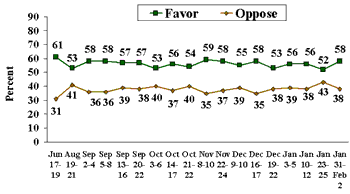 |
Public opinion on the war, however, remains fluid. Those who favor an invasion are divided about evenly between those who say their minds are made up and those who say they could change their minds. Those who are opposed are divided mostly into the unsure category, by a margin of two-to-one. Overall, these results show that 31% of Americans are firmly committed to an invasion, and 13% are firmly opposed. Another 27% lean toward an invasion, but could change their minds; 25% lean against war, but could change their minds. An additional 4% express no opinion, making a total of 56% who could be persuaded either way.
Would you favor or oppose invading Iraq with U.S. ground troops in an attempt to remove Saddam Hussein from power? Would you say – [ROTATED: your mind is made up about invading Iraq, (or) you could change your mind about invading Iraq]?
COMBINED RESPONSES
|
TOTAL |
||||
|
% |
% |
|||
|
Favor invading Iraq with U.S. ground troops |
58 |
|||
|
(Mind is made up about invading Iraq) |
31 |
|||
|
(Could change mind about invading Iraq) |
27 |
|||
|
Oppose invading Iraq with U.S. ground troops |
38 |
|||
|
(Could change mind about invading Iraq) |
25 |
|||
|
(Mind is made up about invading Iraq) |
13 |
|||
|
No opinion |
4 |
4 |
||
|
Could change mind/no opinion |
56 |
|||
A separate question shows a more closely divided public. When asked whether President Bush has made a convincing case for war, 53% of Americans say he has, 44% say he has not. While the responses to this question have become more positive since the president delivered his State of the Union speech (opinion was about evenly divided at 49% to 48%), it still shows that a large proportion of the public remains skeptical about the need to invade Iraq.
This uncertainty in public opinion highlights the importance of Powell's presentation to the U.N. Security Council. Overall, 60% of Americans say the presentation is "very" important to their opinion on the war, and another 27% say it is "somewhat" important.
How important will this presentation of the Bush administration's evidence be in determining your view about invading Iraq – very important, somewhat important, not too important, or not important at all?
|
|
important |
Not too important |
Not important |
|
|
|
2003 Jan 31-Feb 2 |
60% |
27 |
7 |
5 |
1 |
Powell Seen as Credible, Even More Than Bush
After the president's State of the Union speech, the public's confidence in the Bush administration on the issue of Iraq increased. Prior to the speech, Americans were evenly divided over who they trusted more -- the United Nations or the Bush administration. But after the speech, the Bush administration gained the perceptual edge on this matter, by 58% to 39%.
| Trust to Make the Right Decisions Regarding Iraq |
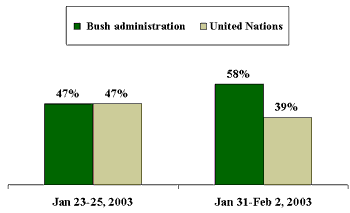 |
Part of that trust in the Bush administration is undoubtedly due to the credibility of Powell. The poll shows that while Americans trust both Bush and Powell on the issue of Iraq, they are more likely to place trust in Powell than Bush. Overall, 88% of Americans express a high level of trust in Powell, compared with 67% who say that about Bush. This includes 56% who have a "great deal" of trust in Powell, compared with 39% who have that level of trust in Bush.
| Trust in George W. Bush and Colin Powell on Iraq Policy |
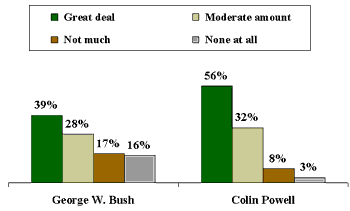 |
| Jan 31-Feb 2, 2003 |
When asked directly who they trust more, Americans choose Powell by a 63% to 24% margin.
| When it Comes to Policy Toward Iraq, Who Do You Trust More? |
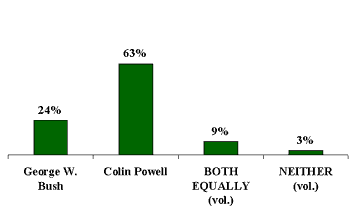 |
| Feb 2, 2003 |
The poll suggests that trust will be important. Already, a substantial number of Americans are ready to believe that the Bush administration will be less than forthcoming about the evidence it presents to the United Nations. A majority of Americans, 58%, believe that the administration is either very (22%) or somewhat (36%) likely to conceal evidence that goes against the administration's position, while 39% say it is not very likely (26%) or not at all likely (13%) to conceal evidence.
Similarly, the public is about evenly divided over whether the administration will present inaccurate evidence -- 49% say it is either very (14%) or somewhat (35%) likely to do so, and 48% say the administration is not very likely (30%) or not at all likely (18%) to present inaccurate evidence.
| Bush Administration Report to the U.N.: Likelihood That Information Will Be Concealed or Inaccurate |
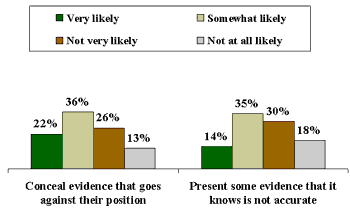 |
| Jan 31-Feb 2, 2003 |
Survey Methods
The latest results are based on telephone interviews with 1,003 national adults, aged 18 and older, conducted Jan. 31-Feb.2, 2003. For results based on the total sample of national adults, one can say with 95% confidence that the margin of sampling error is ±3 percentage points. In addition to sampling error, question wording and practical difficulties in conducting surveys can introduce error or bias into the findings of public opinion polls.
Would you favor or oppose invading Iraq with U.S. ground troops in an attempt to remove Saddam Hussein from power?
|
Favor |
Oppose |
No opinion |
||
|
% |
% |
% |
||
|
2003 Jan 31-Feb 2 |
58 |
38 |
4 |
|
|
2003 Jan 23-25 |
52 |
43 |
5 |
|
|
2003 Jan 10-12 |
56 |
38 |
6 |
|
|
2003 Jan 3-5 ^ |
56 |
39 |
5 |
|
|
2002 Dec 19-22 ^ |
53 |
38 |
9 |
|
|
2002 Dec 16-17 ^ |
58 |
35 |
7 |
|
|
2002 Dec 9-10 |
55 |
39 |
6 |
|
|
2002 Nov 22-24 |
58 |
37 |
5 |
|
|
2002 Nov 8-10 |
59 |
35 |
6 |
|
|
2002 Oct 21-22 |
54 |
40 |
6 |
|
|
2002 Oct 14-17 ^ |
56 |
37 |
7 |
|
|
2002 Oct 3-6 |
53 |
40 |
7 |
|
|
2002 Sep 20-22 ^ |
57 |
38 |
5 |
|
|
2002 Sep 13-16 † |
57 |
39 |
4 |
|
|
2002 Sep 5-8 ^ † |
58 |
36 |
6 |
|
|
2002 Sep 2-4 † |
58 |
36 |
6 |
|
|
2002 Aug 19-21 † |
53 |
41 |
6 |
|
|
2002 Jun 17-19 ^ † |
61 |
31 |
8 |
|
|
2001 Nov 26-27 ‡ |
74 |
20 |
6 |
|
|
2001 Feb 19-21 ‡ |
52 |
42 |
6 |
|
|
^ |
Asked of half sample. |
|||
|
† |
WORDING: Would you favor or oppose sending American ground troops to the Persian Gulf in an attempt to remove Saddam Hussein from power in Iraq? |
|||
|
‡ |
WORDING: Would you favor or oppose sending American troops back to the Persian Gulf in order to remove Saddam Hussein from power in Iraq? |
|||
|
? |
Life Magazine/Gallup. |
|||
Would you favor or oppose invading Iraq with U.S. ground troops in an attempt to remove Saddam Hussein from power?
Would you say – [ROTATED: your mind is made up about invading Iraq, (or) you could change your mind about invading Iraq]?
COMBINED RESPONSES (Q.14-15)
|
2003 Jan 31-Feb 2 |
||
|
Favor invading Iraq with U.S. ground troops |
58 |
|
|
(Mind is made up about invading Iraq) |
(31) |
|
|
(Could change mind about invading Iraq) |
(27) |
|
|
Oppose invading Iraq with U.S. ground troops |
38 |
|
|
(Mind is made up about invading Iraq) |
(13) |
|
|
(Could change mind about invading Iraq) |
(25) |
|
|
No opinion |
4 |
|
Do you think George W. Bush has – or has not—made a convincing case about the need for the U.S. to take military action against Iraq?
|
Yes, has |
No, has not |
No opinion |
|
|
2003 Jan 31-Feb 2 |
53% |
44 |
3 |
|
2003 Jan 23-25 |
49% |
48 |
3 |
How much trust do you have in the Bush administrationto make the right decisions regarding Iraq – a great deal, a moderate amount, not much, or none at all?
BASED ON –504—NATIONAL ADULTS IN FORM A
|
Great |
Moderate amount |
|
|
No |
||
|
2003 Jan 31-Feb 2 ^ |
38% |
34 |
17 |
11 |
* |
|
|
2003 Jan 23-25 |
31% |
34 |
19 |
15 |
1 |
|
|
2002 Dec 9-10 ^ |
32% |
34 |
20 |
12 |
2 |
|
|
^ |
Asked of a half sample. |
|||||
How much trust do you have in the United Nationsto make the right decisions regarding Iraq – a great deal, a moderate amount, not much, or none at all?
BASED ON –504—NATIONAL ADULTS IN FORM A
|
Great |
Moderate amount |
|
|
No |
||
|
2003 Jan 31-Feb 2 ^ |
15% |
49 |
26 |
9 |
1 |
|
|
2003 Jan 23-25 |
17% |
52 |
20 |
10 |
1 |
|
|
2002 Dec 9-10 ^ |
13% |
52 |
27 |
7 |
1 |
|
|
^ |
Asked of a half sample. |
|||||
Who do you trust more to make the right decisions regarding Iraq – [ROTATED: the Bush administration (or) the United Nations]?
BASED ON –504—NATIONAL ADULTS IN FORM A
|
|
|
BOTH EQUALLY (vol.) |
|
|
||
|
2003 Jan 31-Feb 2 ^ |
58% |
39 |
1 |
1 |
1 |
|
|
2003 Jan 23-25 |
47% |
47 |
4 |
1 |
1 |
|
|
^ |
Asked of a half sample. |
|||||
When it comes to U.S. policy toward Iraq, how much trust do you have in George W. Bush – a great deal, a moderate amount, not much, or none at all?
BASED ON –499—NATIONAL ADULTS IN FORM B
|
Great |
Moderate amount |
|
|
No |
|
|
2003 Jan 31-Feb 2 |
39% |
28 |
17 |
16 |
* |
When it comes to U.S. policy toward Iraq, how much trust do you have in Colin Powell– a great deal, a moderate amount, not much, or none at all?
BASED ON –499—NATIONAL ADULTS IN FORM B
|
Great |
Moderate amount |
|
|
No |
|
|
2003 Jan 31-Feb 2 |
56% |
32 |
8 |
3 |
1 |
Who do you trust more when it comes to U.S. policy toward Iraq – [ROTATED: George W. Bush (or) Colin Powell]?
BASED ON –499—NATIONAL ADULTS IN FORM B
|
|
|
BOTH EQUALLY (vol.) |
|
|
|
|
2003 Jan 31-Feb 2 |
24% |
63 |
9 |
3 |
1 |
As you may know, on Wednesday, Secretary of State Colin Powell will meet with the United Nations Security Council to present evidence that the Bush administration says it has that proves that Iraq has weapons of mass destruction.
How important will this presentation of the Bush administration's evidence be in determining your view about invading Iraq – very important, somewhat important, not too important, or not important at all?
|
|
important |
Not too important |
Not important |
|
|
|
2003 Jan 31-Feb 2 |
60% |
27 |
7 |
5 |
1 |
Just your best guess, how likely is the Bush administration to [RANDOM ORDER]when it speaks to the U.N. Security Council on Wednesday -- very likely, somewhat likely, not very likely, or not at all likely?
A. Present some evidence that it knows is not
accurate
|
Very |
Somewhat |
Not very |
Not at all likely |
No |
|
|
2003 Jan 31-Feb 2 |
14% |
35 |
30 |
18 |
3 |
B. Conceal evidence that goes against their position
|
Very |
Somewhat |
Not very |
Not at all likely |
No |
|
|
2003 Jan 31-Feb 2 |
22% |
36 |
26 |
13 |
3 |
* -- Less than 0.5%
